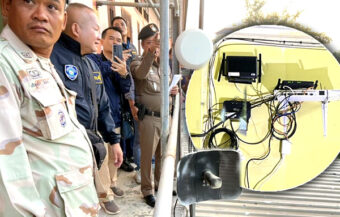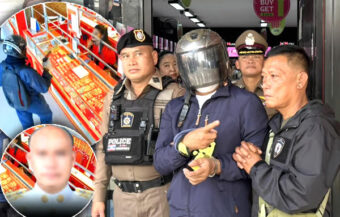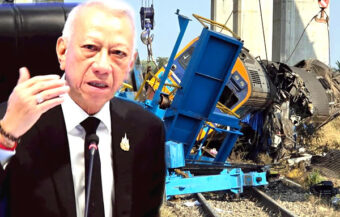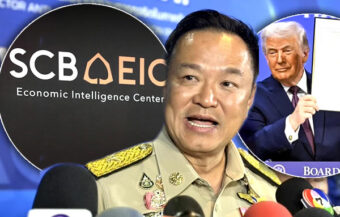Thailand begins talks with the US on tariffs as exports dip in June. The government seeks an extension to the July 8 deadline while cracking down on illegal trade and nominee firms with new anti-money laundering laws to protect the economy and support exporters.
Commerce Minister Pichai Naripthaphan on Monday highlighted continued success of Thai exports in May. However, he acknowledged that exports to the United States began to weaken in June. Furthermore, the minister revealed that Thai and US negotiators are likely to engage in talks in the coming weeks. At the same time, he dismissed reports of an imminent extension to the July 8 deadline for countries involved in negotiations with the US administration. Mr. Pichai also outlined actions by his ministry to address substandard products and the use of nominee shareholders by foreigners seeking to circumvent Thai law. Specifically, a new amendment to the Anti-Money Laundering Act will be introduced to enable the seizure of assets from such firms, treating them as proceeds of money laundering.
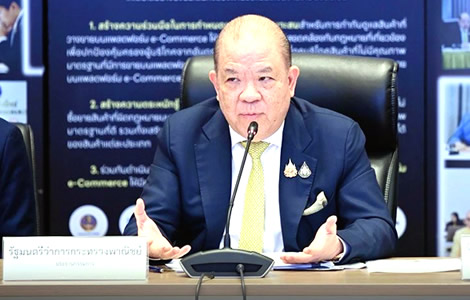
Thailand’s export sector remains strong despite ongoing challenges. Commerce Minister Pichai Naripthaphan reported preliminary data on Monday showing continued export growth in May 2025. Official export figures will be released on June 18. Early analysis indicates double-digit expansion. Pichai called the export sector the “hero” of Thailand’s economy during the press briefing.
He explained that even though the US imposed a 10% tariff on many Thai goods, exports continue to rise. The sustained growth reflects exporters’ resilience and adaptability. However, Pichai expressed concern about the baht’s strength.
He noted that if the Bank of Thailand could weaken the currency, export competitiveness would improve.
Cross-border trade with Cambodia closely monitored amid export growth and border market concerns
Cross-border trade with Cambodia is being monitored closely, especially regarding its impact on local markets. The Commerce Ministry is paying attention to border dynamics as part of the broader export strategy.
Pichai also revealed that exports to the United States in June were weaker compared to May. This decline reflects uncertainty caused by unresolved reciprocal tariffs imposed by the US government. Negotiations between Thailand and the United States are expected to occur next week. The talks aim to address these tariffs and prevent further trade disruptions.
While initial discussions are planned via video conference, in-person meetings may follow. The Thai delegation will be led by Deputy Prime Minister and Finance Minister Pichai Chunhavajira, supported by senior officials from the Commerce Ministry.
The US suspended tariff enforcement for 90 days, ending on July 8. Washington has stated that countries actively engaged in negotiations may receive additional extensions. Thailand expects this extension due to its constructive participation.
Minister Pichai outlines tariff outlook and negotiations as exporters seek extended deadline to avoid disruption
According to Minister Pichai, the likely tariff rate after negotiations will remain around 10%. He called this rate “competitive” and manageable under current circumstances. Pichai said negotiations were “positive” and expressed cautious optimism about reaching an agreement by July 8. He estimated a 50-50 chance of concluding talks within the extension period.
The Thai private sector has voiced concerns about the timeline. Export shipments to the US can take 40 to 90 days. Therefore, if no agreement is reached before July 8, exporters risk incurring sudden additional costs. To prevent this, industry representatives are urging negotiators to secure at least a 90-day tariff extension.
Reflecting the urgency, the Commerce Ministry advanced the usual timing of its May export announcement by two weeks. This earlier release is unusual and signals increased government attention on the issue.
On June 16, Minister Pichai chaired a meeting with representatives from 17 government agencies. The meeting addressed efforts to curb illegal trade practices and improve product quality control. This initiative follows directives from Prime Minister Paethongtarn Shinawatra.
Government meeting targets illegal e-commerce and product quality with four priority enforcement strategies
The meeting focused on four key areas: enforcement against illegal e-commerce activities, strict inspection of imported goods, verification of product origin claims, and tightening controls over transhipment practices. These measures aim to protect consumers and legitimate businesses.
From September 2024 to May 2025, authorities prosecuted 57,739 cases involving illegal goods. The total estimated damage exceeded ฿2.28 billion. Additionally, the government collected ฿1.875 billion in unpaid import taxes on undervalued shipments.
Enforcement agencies removed over 14,976 illegal listings from online platforms. They also cracked down on 861 nominee companies. These nominee firms are illegal entities registered in Thailand but effectively controlled by foreigners, violating ownership laws.
The damage attributed to nominee firms exceeded 15.29 billion baht. The government is taking decisive action to prevent such abuses. One key strategy is applying anti-money laundering laws to nominee activities.
AMLO amendment aims to criminalize nominee firms and allow asset seizure under anti-money laundering law
The Anti-Money Laundering Office (AMLO) is preparing a draft amendment. This amendment would classify nominee operations as a predicate offence for money laundering. As a result, nominee-controlled companies could have assets frozen or seized.
The draft amendment has passed public consultation and is now under review by the Council of State. Afterwards, it will be submitted to the Cabinet and then Parliament for consideration. Officials expect the law to pass within six to twelve months.
Once enacted, the law will impose criminal penalties and asset forfeiture on nominee companies. This move aims to close existing loopholes exploited by foreign interests.
To strengthen enforcement, the Commerce Ministry signed a Memorandum of Understanding with the Ministry of Interior. This agreement enables the exchange of land ownership and company registration data.
Provincial governors have been instructed to establish task forces by June 18. These teams will investigate suspected nominee companies. Initial inspections will cover 46,918 businesses flagged as high risk.
Four provinces prioritized for nominee crackdown with task forces led by deputy governors and local agencies
Four provinces are prioritized: Bangkok, Chonburi, Phuket, and Surat Thani. These areas have significant foreign investment and a history of nominee abuses.
Deputy Minister Napintorn Srisanpang outlined the structure of provincial teams. Each team will be led by a deputy governor. Members include local police, tax officers, labour officials, and commerce representatives. The teams will collaborate closely to complete investigations within one year.
The plan divides work into phases. The first six months focus on 69 provinces. The remaining seven high-risk provinces will receive central government support.
In parallel, the government is blocking the registration of new nominee companies. The draft law will formally prohibit such registrations and allow asset seizure.
At the same meeting, the Food and Drug Administration (FDA) presented inspection results on imported goods. The FDA reported a 32% increase in toxic residue detections in 2024 compared to 2023. This rise follows a 25% increase from 2022.
FDA warns of rising toxic residues in imported goods, urging stronger controls, especially in Free Zones
The FDA warned that without improved controls, contaminated imports may continue to rise.
Particular concern exists for goods entering Free Zones, where inspections have historically been weaker. These are government special economic zones designed to enhance economic development.
The Commerce Ministry supports the FDA’s call for stricter safety measures. It aims to create a safer and more transparent trading environment.
Thai Minsters engage with US trade chief Jamieson Greer in Paris at global OECD ministerial meeting.
On the run UK fraudster on Ko Samui who ran a hotel and six restaurants under a fake alias is arrested
DSI confirms arrested Chinese man is a state employee of China. Chuanling Zhang later released on bail
In summary, Thailand is addressing several important challenges. It is negotiating with the United States to resolve tariff issues. At the same time, it is protecting exports by monitoring currency effects and shipping risks. The government is also intensifying efforts against illegal trade practices and foreign nominee companies.
These actions are coordinated across multiple ministries and agencies. The goal is to safeguard economic growth and promote fair trade. Over the coming months, progress on these fronts will be critical for Thailand’s export outlook—indeed, for the wider economy, which has been decimated by infiltration from foreign firms and goods, mainly from China.
Join the Thai News forum, follow Thai Examiner on Facebook here
Receive all our stories as they come out on Telegram here
Follow Thai Examiner here
Further reading:
Thai Minsters engage with US trade chief Jamieson Greer in Paris at global OECD ministerial meeting
Commerce Minister meets US trade boss Jamieson Greer in Korea. Paul Chambers case still dogs talks


